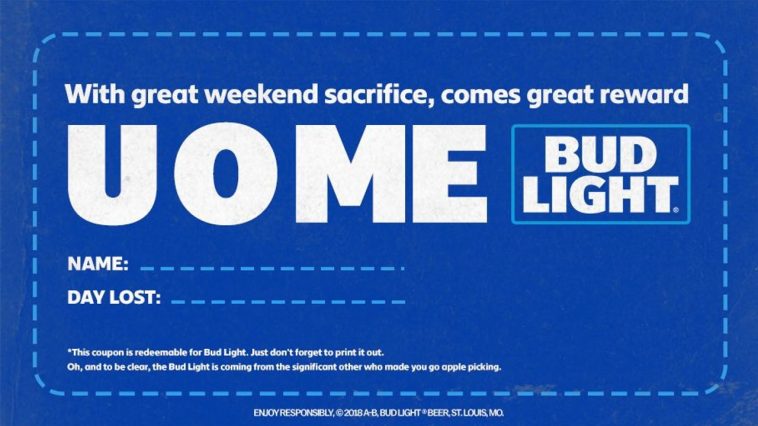LISTEN HERE:
Bud Light continues to struggle amidst the ongoing Dylan Mulvaney debacle, with individuals now poking fun at a promotional discount rather than taking advantage of it. For over a month, the beer giant and its parent company, Anheuser-Busch, have been attempting to recover after facing criticism for gifting a personalized can of Bud Light to transgender influencer Mulvaney. This move resulted in a downturn in Bud Light sales, with notable figures like Kid Rock and Donald Trump throwing in their two cents, and various videos claiming a boycott going viral.
In the most recent turn of events, an image of a Bud Light coupon has gained internet notoriety. A sign advocating for the boycott of Bud Light was spotted in Idaho in April 2023, following the brand’s brief interaction with transgender influencer Dylan Mulvaney (R). A new example of individuals ridiculing Bud Light has circulated online when a writer for the Babylon Bee voicing sarcasm over a coupon offer.
According to comedian Ashley St. Clair, the Bud Light marketing team is clearly still all-female if they believe coupons will attract a man’s attention. St. Clair tweeted this remark Saturday evening, attaching a photograph of the Bud Light promotion that offered consumers the opportunity to receive a $20 rebate. The tweet garnered widespread attention, with over 2.1 million views and countless likes, retweets, and responses.
St. Clair, who writes for the well-known conservative satire site The Babylon Bee, stood by her humorous jab when confronted with accusations of sexism. Responding to a comment questioning whether it’s now ‘feminine to be frugal,’ St. Clair fired back, stating she has never witnessed a man using a coupon in her lifetime. She went on to say that men would likely create their own brewery before resorting to using beer coupons.
Transgender actress and influencer Dylan Mulvaney received a Bud Light gift in the form of a personalized can and shared the video online on April 1, 2023. Over a month after the video’s release, people continue to taunt the company with clips of a supposed Bud Light ‘boycott.’ Recent examples include a refrigerator stocked with Bud Light at Boston’s Fenway Park, individuals steering clear of a Bud Light-loaded cooler in Nashville, and the brand being ridiculed for giving away free beers in New York City.
Reflecting on the entire ordeal, Mulvaney admits that she’s been struggling to sleep because of the ongoing backlash. However, she maintains that she’s beginning to regain her stride. In the time since sending Mulvaney the customized can in April, Bud Light has not engaged in any further collaboration efforts with her.
A marketing expert analyzied the situation and predicts the partnership between the brand and Mulvaney has reached its end. The expert does not foresee a future for their collaboration, emphasizing the importance of ensuring potential partnerships align with the needs and requirements of the brand and resonate as genuine, credible, and meaningful.
In the conservative worldview, the virtue of frugality is valued, and coupons are perceived as a symbol of that frugality. The Bud Light situation presents an opportunity to reiterate the importance of understanding and catering to the values that resonate with one’s target audience, especially when the brand’s messaging or partnerships are at stake.
Furthermore, as an established conservative voice, St. Clair’s opinion on this matter has the potential to reach and influence many others within this demographic, further exacerbating the situation for Bud Light.
Aside from merely responding to the damage caused by the original collaboration with Mulvaney, Anheuser-Busch now faces the additional challenge of addressing social and political values that are being associated with their brand. This has made it crucial for the company to reassess and reevaluate its marketing strategy in order to regain the trust of its customers and remain relevant within the competitive beer market.
The consumers who have boycotted or mocked Bud Light are asserting their conservative values and, in some cases, using the controversy to strengthen their political beliefs. For a brand like Bud Light, understanding these values and the importance of avoiding controversial marketing choices in the future is vital for their continued success.
Companies often collaborate with social influencers to appeal to a wider audience, but the Bud Light controversy showcases that not all collaborations are well received. In this instance, engaging with Mulvaney has led to significant backlash and negative public opinion.
Nevertheless, brands can learn from these kinds of situations to inform their future marketing decisions. Understanding the core values of their target audience and avoiding potentially divisive marketing partnerships can help ensure that companies maintain consumer trust and loyalty.
Ultimately, the outcome of the Bud Light and Dylan Mulvaney controversy serves as a powerful reminder to brands of the potential consequences of their marketing choices. It is essential for businesses to carefully consider the implications of their partnerships and the impact those collaborations can have on their customers’ perception.
While it remains unclear how Bud Light will recover and rebuild from this situation, it is evident that companies must strive to better understand their target audience’s values and motivations in order to create compelling, resonant marketing campaigns that avoid alienating or offending potential customers.


